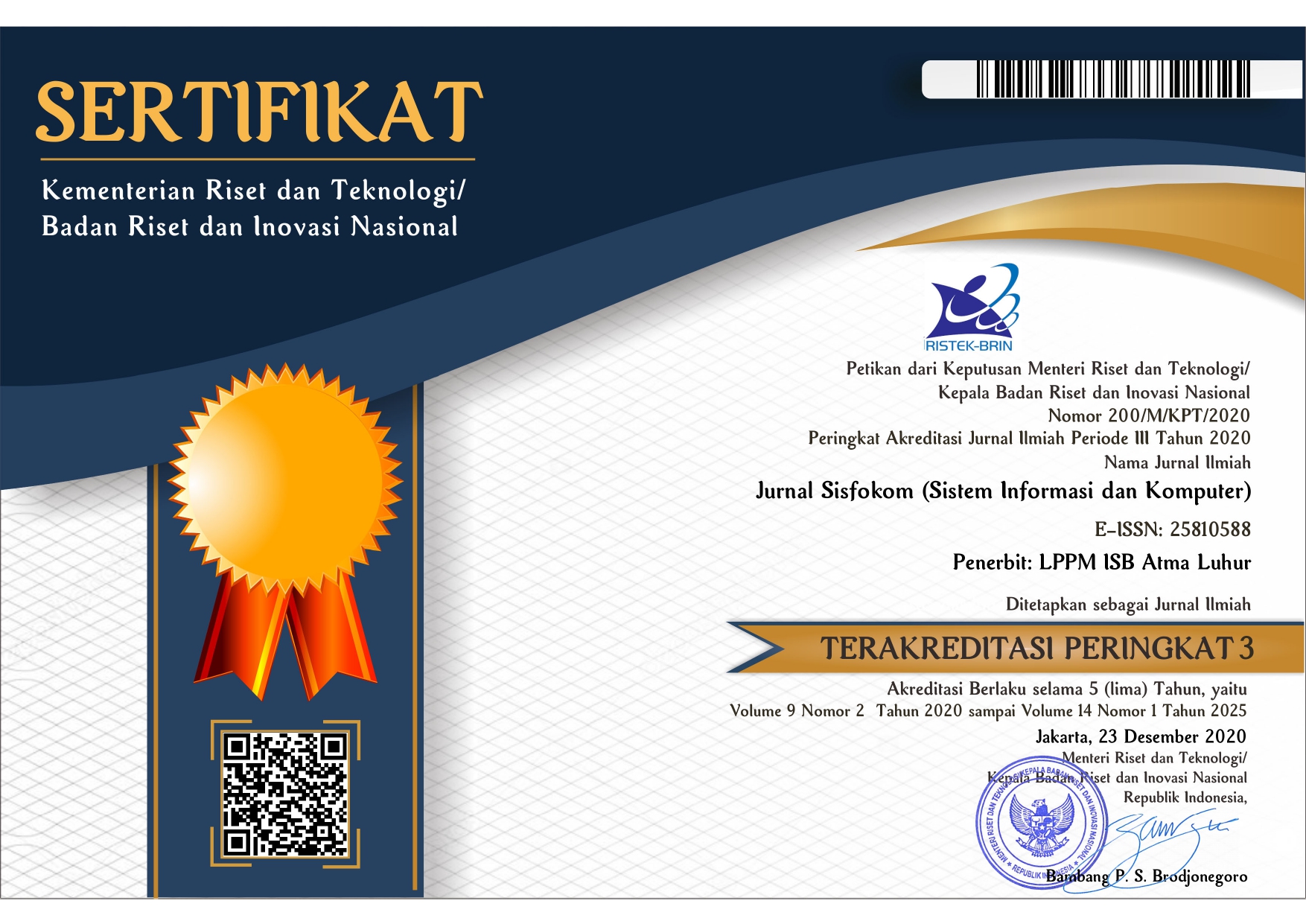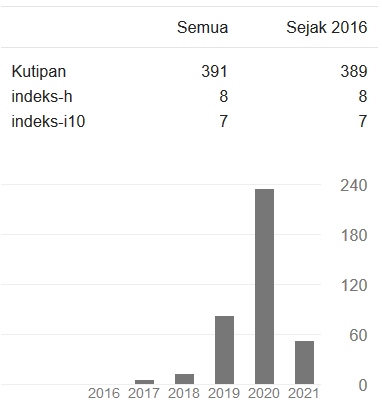Editorial Policies
- Focus and Scope
- Section Policies
- Peer Review Process
- Publication Frequency
- Open Access Policy
- Archiving
- Publication Ethics
- Publication Fees
- Screening Plagiarism
- Article Publication
- Article Cancellation
- Article Without Clarity
Focus and Scope
Jurnal Sisfokom (Sistem Informasi dan Komputer) provides a forum for publishing the original research articles from contributors.
Topics cover the following areas (but are not limited to):
1. Information Systems Engineering
- Development, Management and Utilization of Information Systems (With Quantitative Analysis)
- Organizational Governance
- Enterprise Resource Planning
- Enterprise Architecture Planning
- e-Business
- e-Commerce
2. Business Intelligence
- Data Mining
- Text Mining
- Data Warehouse
- Online Analytical Processing
- Artificial Intelligence
- Decision Support System
- Machine Learning
3. Information Technology (IT)
- Software Engineering (Quantitative Research)
- Game
- Information Retrieval
- Computer network
- Telecommunication
- Internet
- Wireless technology
- Network security
- Multimedia Technology
- Mobile Computing
- Parallel/Distributed Computing
Section Policies
Articles
Section
Editors- Henderi Henderi
- Eza Budi Perkasa
- Untung Rahardja
- Sujono Sujono
- Rahmat Sulaiman
- Dwi Yuny Sylfania
Peer Review Process
Every article that goes to the editorial staff will be selected through Initial Review processes by the Editorial Board. Then, the articles will be sent to Peer Reviewer and will go to the next selection by Blind Review Process. After that, the articles will be returned to the Authors to revise. These processes take two months for a maximum time. In each manuscript, Peer Reviewer will be rated from the substantial and technical aspects. Peer Reviewer that collaboration with Sisfokom is the experts and issues around the scope.
The principle of recruitment of reviewers has at least written scientific journals as the first author, or a member of the author on three pages of articles, both publications of accredited national-scale scientific journals and international-scale scientific journal publications.
All submitted manuscripts are read by the editorial board. Those Manuscript evaluated by editors to be inappropriate to journal criteria is rejected promptly without external review. Manuscript evaluated to be of potential interest to our readership are sent to blind reviewers. The editors then make a decision based on the reviewer's recommendation from among several possibilities: rejected, revision required, or accepted.
The editor has the right to decide which manuscripts submitted to the journal should be published.
Review Process :
- The author submits the manuscript
- Initial Review by Editor (some manuscript may be rejected or returned before the review process). If it does not match the scope of the Jurnal Sisfokom, it will be returned for rejection, so if there are things that do not match the regularized style Sisfokom, then the paper will be returned to the author, if it is appropriate With a Sisfokom's regularized style, it will be assigned to reviewers.
- The blind peer review process. Total reviewers two (2) people, if the assessment result of imbalanced, it will be submitted to an additional reviewer. The maximum limit is 2 months to review.
- Editor Decision
- Confirmation to the author
Publication Frequency
Starting from 2020, Jurnal Sisfokom (Sistem Informasi dan Komputer) is published three times a year in March, July and November.
Open Access Policy
This journal provides immediate open access to its content on the principle that making research freely available to the public supports a greater global exchange of knowledge.
Archiving
This journal utilizes the LOCKSS system to create a distributed archiving system among participating libraries and permits those libraries to create permanent archives of the journal for purposes of preservation and restoration. More...
Publication Ethics
This statement clarifies the ethical behavior of all parties involved in the act of publishing an article in this journal, including the author, the chief editor, the Editorial Board, the peer-reviewer and the publisher (LPPM ISB Atma Luhur). This statement is based on COPE’s Best Practice Guidelines for Journal Editors.
Ethical Guideline for Journal Publication
This journal committed to upholding the highest standards of publication ethics and takes all possible measures against publication malpractice. Authors who submit papers to Jurnal Sisfokom attest that their work is original and unpublished, and is not under consideration for publication elsewhere. In addition, authors confirm that their paper is their own; that it has not been copied or plagiarized, in whole or in part, from other works; and that they have disclosed actual or potential conflicts of interest with their work or partial benefits associated with it.Publication decisions
The editor of the Jurnal Sisfokom (Sistem Informasi dan Komputer) is responsible for deciding which of the articles submitted to the journal should be published. The validation of the work in question and its importance to researchers and readers must always drive such decisions. The editors may be guided by the policies of the journal's editorial board and constrained by such legal requirements as shall then be in force regarding libel, copyright infringement and plagiarism. The editors may confer with other editors or reviewers in making this decision.
Disclosure and conflicts of interest
Unpublished materials disclosed in a submitted manuscript must not be used in an editor's own research without the express written consent of the author.
1. DUTIES OF EDITORS
Editor of the Journal of Infotel is responsible for taking decisions manuscripts will be published in the Jurnal Sisfokom (Sistem Informasi dan Komputer). The editor can be guided by the policy of the editorial board and constrained by the requirements of applicable laws regarding defamation, copyright infringement and plagiarism. Editors can discuss with other editors or reviewer in making this decision.
Fair Play
Editors will evaluate the manuscripts in accordance with the intellectual content without regard to race, sex, sexual orientation, religion, ethnicity, nationality, or political philosophy of the author
Confidentiality
The Editor and editorial staff should not provide any information about a submitted manuscript to someone other than the corresponding author, reviewers, potential reviewers, other editorial advisers, and the publisher, as appropriate.
Conflict of interest
The materials that are not published in a submitted manuscript may not be used for the editor's own research without the express written consent of the author.
2. DUTIES OF REVIEWER
Contribution to Editorial Decisions
The review process may assist the auditor in making editorial decisions and through the communication between editor with the author will assist the author in improving the manuscript.
Promptness
Any selected referee who feels unqualified to review the research reported in a manuscript or knows that its prompt review will be impossible should notify the editor and excuse himself from the review process.
Confidentiality
Each manuscript has been accepted for review must be treated as confidential documents. The manuscript should not be shown or discussed with others except with permission from the editor.
Standards of Objectivity
The review should be conducted objectively. Personal criticism of the author is not allowed. Reviewers must show clearly the results of the assessment along with supporting arguments.
Acknowledgement of Sources
Reviewers should identify relevant published work that has not been cited by the authors. Any statement that an observation, derivation, or argument had been previously reported should be accompanied by the relevant citation. A reviewer should also call to the editor's attention any substantial similarity or overlap between the manuscript under consideration and any other published paper of which they have personal knowledge.
Conflict of Interest
Unpublished material contained in the manuscript must not be used for the reviewer's own research without the written permission of the author. Special information and ideas obtained through a review process should be kept confidential and not used for personal purposes. Reviewers should not consider manuscripts that have a conflict of interest due to a script that is competitive, collaborative, or other relationships with one of the authors, or a company involved with the script.
3. DUTIES OF AUTHOR
Reporting Standard
Authors of reports of original research should present an accurate account of the work performed as well as an objective discussion of its significance. The main data to be represented accurately in the script. The manuscript should contain sufficient detail and references that allow others to do the research again. Fraudulent or knowingly inaccurate statements constitute unethical behavior and are unacceptable.
Data Access and Retention
The author was asked to provide the raw data associated with the text for editorial review process and should be prepared to provide public access to such data , if practicable, and should in any event be prepared to retain such data for a reasonable time after publication.
Originality and Plagiarism
The authors should ensure that they have written entirely original works, and if the authors have used the work and/or words of others that this has been appropriately cited or quoted.
Multiple, Redundant or Concurrent Publication
An author should not, in general, publish manuscripts describing essentially the same research in more than one journal or primary publication. Submitting the same manuscript to more than one journal concurrently constitutes unethical publishing behavior and is unacceptable.
Acknowledgment of Sources
Proper acknowledgment of the work of others must always be given. Authors should cite publications that have been influential in determining the nature of the reported work.
Authorship of the Paper
Authorship should be limited to those who have made a significant contribution to the conception, design, execution, or interpretation of the reported study. All those who have made significant contributions should be listed as co-authors. Where there are others who have participated in certain substantive aspects of the research project, they should be acknowledged or listed as contributors. The corresponding author should ensure that all appropriate co-authors and no inappropriate co-authors are included on the paper, and that all co-authors have seen and approved the final version of the paper and have agreed to its submission for publication.
Disclosure and Conflicts of Interest
All authors should disclose in their manuscript any financial or other substantive conflicts of interest that might be construed to influence the results or interpretation of their manuscript. All sources of financial support for the project should be disclosed.
Fundamental errors in published work
When an author discovers a significant error or inaccuracy in his/her own published work, it is the author’s obligation to promptly notify the journal editor or publisher and cooperate with the editor to retract or correct the paper.
Publication Fees
Screening Plagiarism
The authors must ensure that the written works are fully original and has not published elsewhere. The papers submitted and will be screened and checked for plagiarism by using plagiarism detection tools, but an author should checked it to before submmited. Recommended plagiarism tools are Turnitin, iThenticate, and Plagiarisma. The paper must have similarity index of 20% or less, or the paper will be rejected before processing to further review by peer-reviewer.
Article Publication
All authors are free to make submissions at any time to the Jurnal Sisfokom (Sistem Informasi dan Komputer). We do not provide a specific scheduling time for submissions.
Please note that there is no guarantee that the articles that have been submitted for a long time will be published earlier than the newer one (not first in first out). Every article has the same possibility to be published with the condition that it has gone through the entire publishing process, such as peer review, revision, payment, and publication copyright transfer.
Article Cancellation
Authors are not allowed to cancel a manuscript that has been sent because it is a waste of work related to the energy and time done by the editor and/or the reviewer.
If the author still wants to cancel the submitted manuscript, he/she will be subject to a fine of Rp. 600,000, - (six hundred thousand rupiah). Cancellations will be made by the editor, if the author has made payment and sends the proof of payment.
If the author does not agree to pay a fine, the author will be blacklisted for further publication in the Jurnal Sisfokom (Sistem Informasi dan Komputer).
Article Without Clarity
Authors who have submitted the manuscript and have gone through the review process, and the results of the review have been submitted by the editor to the author. However, there is no response from the author to improve the manuscript within a period of more than 3 months and/or 3 times notification by the email, then the editor has the right to reject the article.
As a consequence, the author will be blacklisted for further publication in the Jurnal Sisfokom (Sistem Informasi dan Komputer).








